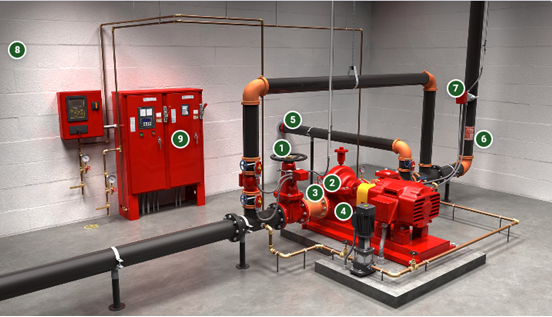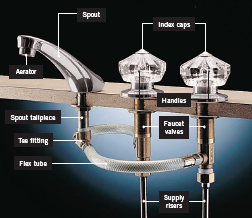Weekly Inspections of Electric Fire Pumps: Fire pumps are an essential part of many water-based fire protection systems. They are used to increase the pressure (measured in psi or bar) of a water source when that source is not adequate for the system it’s supplying.
 |
| Electric Fire Pumps |
Weekly Inspections of Electric Fire Pumps
Fire pumps are an essential part of many water-based fire protection systems. They are used to increase the pressure (measured in psi or bar) of a water source when that source is not adequate for the system it’s supplying. The right design, installation, and acceptance testing of these pumps will ensure that they are ready and available to protect the building on the day of the acceptance test. After that, once “the keys” are handed over to the building owner, there is no guarantee that the pump will remain in a ready state to work as designed unless it undergoes routine inspection, testing, and maintenance(ITM). The requirements for ITM of fire pumps are found in NFPA 25, Standard for the Inspection, Testing, and Maintenance of Water-Based Fire Protection Systems.
While there is a good deal that goes into a robust ITM program for Fire Pumps, this blog will focus on weekly inspections of Fire Pumps and what is required. While seemingly self-explanatory, NFPA 25 defines weekly as occurring once per calendar week.
What is an inspection?
 |
| Inspections of Electric Fire Pumps |
Pump House/Room- Weekly Inspection
- Heat is adequate, not less than 40° F (4°C)
- Excessive water does not collect on the floor
- Coupling guard is in place.
Pump System Conditions- Weekly Inspection
- Pump suction, discharge and bypass valves are fully open
- Piping is free of leaks
- Suction line pressure gauge reading is within acceptable range
- Suction reservoir has the required water level
- Wet pit suctions screens are unobstructed and in place
- Waterflow test valves are in the closed position, the hose
- connection valve is closed, and the line to test valves is free of water.
Electrical System Conditions- Weekly Inspection
 |
Controller |
Conditions of the electrical system must be inspected weekly for the following items:
- Controller pilot light (power on) is illuminated
- Transfer switch normal pilot light is illuminated
- Isolation switch is closed – standby (emergency) source
- Reverse phase alarm pilot light is off, or normal phase rotation pilot light is on
- Oil level in vertical motor sight glass is within acceptable range
- Power to pressure maintenance (jockey) pump is provided.
What about weekly tests?
Diesel fire pumps and some Electric Fire Pumps require weekly churn (no flow) testing. These tests, which do not flow water, confirm that the pump can automatically start and will not overheat. Weekly testing of Electric Fire Pumps is required where pumps serve systems in buildings that are beyond the pumping capacity of the fire department, Fire Pumps with limited-service controllers, vertical turbine pumps, and pumps taking suction from ground level tanks or a water source that does not provide sufficient pressure to be of material value without the pump. While these weekly tests require several visual observations to be made these are not part of the discussion here.



